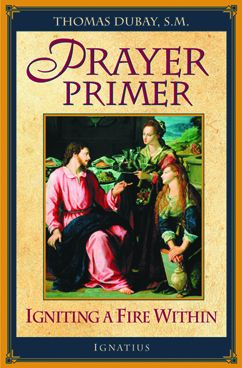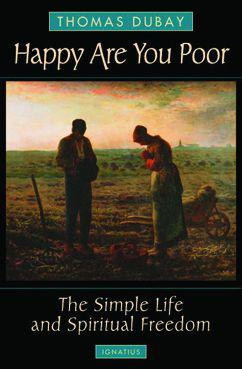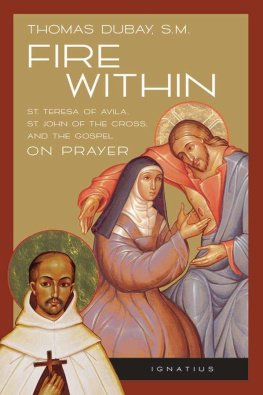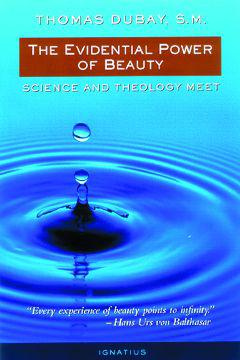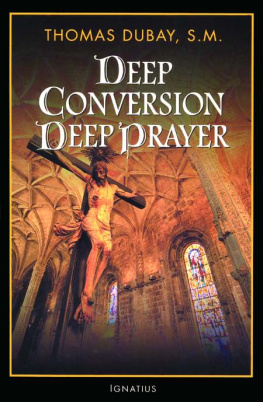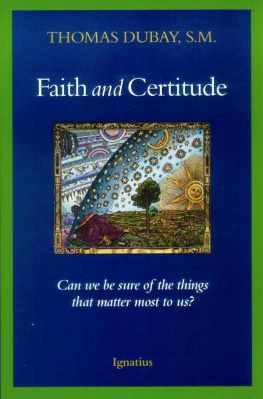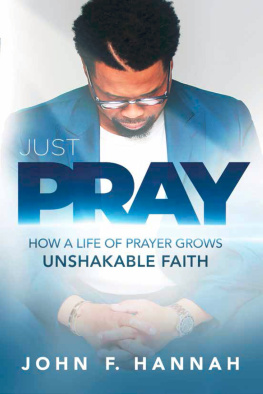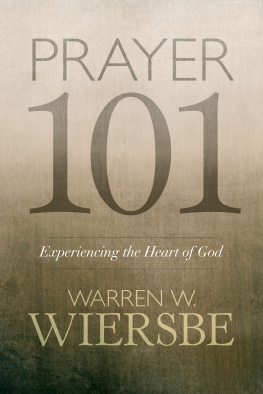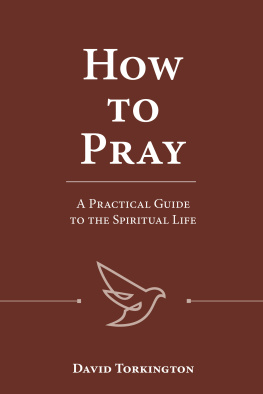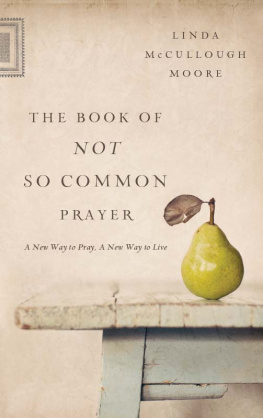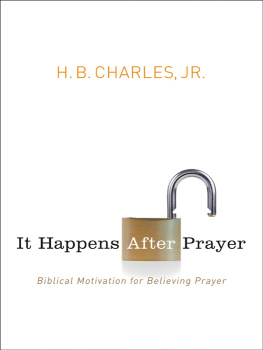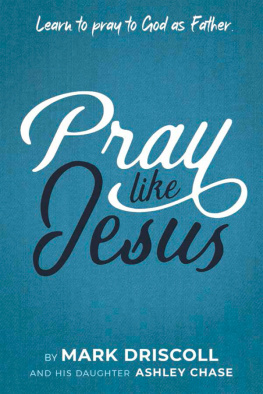PRAYER PRIMER
THOMAS DUBAY, S.M.
PRAYER
PRIMER
Igniting a Fire Within
IGNATIUS PRESS SAN FRANCISCO
Cover art:
Alessandro Allori
Christ in the House of Mary and Martha
Erich Lessing / Art Resource, N.Y.
Cover by Riz Boncan Marsella
2002 Ignatius Press, San Francisco
All rights reserved
ISBN 0-89870-840-0
Library of Congress Control Number 2001097040
Printed in the United States of America
CONTENTS
I
PRELIMINARIES
II
INTERPERSONAL UNION / INTIMACY
III
CHURCH AND FAMILY
IV
QUESTIONS AND PROBLEMS
PREFACE
In the important matters of human life beginners need help: learning, thinking, reading, writing, relating with others.
The most momentous of all human activities, relating with God, is no exception. Prayer Primer is intended to aid beginners in prayer. We especially envision people who somehow sense that communion with God should have at least a significant place in their lives, and yet they are not quite sure what prayer is or how to go about it. Many want to grow in their prayer lives but are not at all confident as to just what that would entail.
In these pages I shall try to combine clarity and simplicity with respect for the intelligence of the reader. I ask that no one interpret beginner in these pages to be equivalent to uneducated. A person can have a doctorate in one field and be a novice in another. While we shall avoid complex academic language, our text will call for reflective pondering on the part of young and old alike, and of everyone in their middle years as well. Our subject is both simple and deep.
I should like to take occasion here to thank Brother Sean Wright, O.Ss.S for his highly competent reading and critiquing of the text. He has provided a signal service to both the author and the reader.
ABBREVIATIONS
CCC Catechism of the Catholic Church
CD Christus Dominus, Vatican Council II, Decree on the Pastoral Office of Bishops
EPB Evidential Power of Beauty, Thomas Dubay, S.M.
FW Fire Within, Thomas Dubay, S.M.
GILH General Instruction of the Liturgy of the Hours, Sacred Congregation for Divine Worship
JB Jerusalem Bible
LC Laudis Canticum, Paul VI, promulgation of the new Liturgy of the Hours
LG Lumen gentium, Vatican Council II, Constitution on the Church
OT Optatam totius, Vatican Council II, Decree on Priestly Training
SC Sacrosanctum concilium, Vatican Council II, Constitution on the Liturgy
SSD Seeking Spiritual Direction, Thomas Dubay, S.M.
PART ONE
PRELIMINARIES
Thirsting and Quenching
M en and women everywhere are hungry and thirsty, voraciously yearning and seeking: rich and poor, wise and foolish, young and old, literate and illiterate, saints and sinners, atheists and agnostics, playboys and prostitutes. Some can explain their inner emptiness in words; most cannot, but everyone experiences it. That inner ache drives all our dreams, desires, and decisionsgood and bad. Even your decision to pick up this book and read was triggered by this nameless desire.
Our abiding hunger for more than we presently experience does not have to be proved but only explained. Which is what we propose to do right now, before we even begin to think about what prayer is all about. Otherwise you and I cannot understand fully the splendid reality of communing deeply with our Creator and Lord and of our unspeakable destiny in and with him.
Mere animals do not and cannot have this inner aching need, for the simple reason that material things are satisfied with visible creation and their place in it. Because you and I have intellects and wills rooted in our profound spiritual core, nothing finite and limited does, or ever can, fill us. Deep in our humanness is an ache for fullness, for infinity. We are completely satisfied by no individual egoism, by no series of selfish pursuits: vanity, fame, money, lust, power, drugs. Always the sinner seeks more accolades, more money, more recognition, more lewd eroticism, more control of others, more drugs. Never is he satisfied, never really happy and fulfilled.
Why is this so? As spirit-in-the-flesh beings, you and I burst beyond the material order, beyond what our senses can attain, beyond the cosmos itself. By its limited nature nothing created can satisfy us. God alone, the sole infinite One, can fill our endless yearnings. As Karl Rahner put it, we are oriented by nature to the Absolute. Or as John Courtney Murray expressed it, the problem now is not how to be a man, but how to become more than a man. Or as St. Augustine put it in his classic prayer: You have made us for yourself, O Lord, and our hearts are restless until they rest in you. Kittens and giraffes do not have this problem. They cannot. You and I do. (See CCC 2730.)
Quenching and prayer
What does this have to do with a primer on prayer? Much, very much. Prayer is not merely a pious reaction to suffering or a means to get us out of trouble. We are the only beings in visible creation who cannot attain fulfillment without becoming more than we are, therefore without the divine. Ducks and camels, trees and stars need matter alone. In other words, you and I are transcendent beings whose needs go beyond this universe. That is why our destiny must be God and no one else. That is why prayer is absolutely basic. This is the divine plan, and no other plan comes close. At the heart of our human reality there must be a relationship and communion with the divine. O therwise we simply do not make it; we do not and cannot flourish and attain our destiny. (See EPB, pp. 17-20.)
Prayer, therefore, is both simple and deepand, as we shall see later on, immensely enriching, leading to unspeakable love and delight. Prayer is not complicated, because there is nothing more natural than to converse with your beloved, and most especially with your supreme Beloved. If all grows normally it becomes deep, because, as we have explained, it is rooted in your profound human and spiritual reality, in who and what you are as a man or a woman.
The illness of boredom
But we need to look at all this from another point of view, the downside of our human situation. Among the saddest pictures we meet in life is a jaded face: the visage of one who has done it all, whose life through wanton sin is a shambles. It is a countenance that expresses no joy, no peace, no excitement, no enthusiasm, no interest, no hope, no love, no fulfillment. Behind that face is an inner desert of degenerate exhaustion, completely empty of lively delight.
Jadedness is extreme boredom, but there are lesser degrees, of course. But even lesser shadings are abnormalities. Human beings are meant to be alive and vibrant, full of wonder, love, and happinesswhich is exactly what Scripture promises to those who embrace Gods word fully. This is what the saints experience, what people who have a deep prayer life know to be the case. They rejoice in the Lord always, not just some of the time (Phil 4:4).
Jadedness and boredom and an absence of vibrant prayer comprise one reason among others that the great novelist Fyodor Dostoyevsky was right on target when he made the comment that to live without God is nothing but torture. Not everyone admits this, of course. One reason is pathological denial. Another is that when people are so submerged in self-centered pleasure seeking, they cannot see what some silence and solitude and honesty would make obvious to them. A third explanation for the denial is that bored people often use pleasures, both licit and illicit, as so many narcotics that tend to dull the deep inner pain of their emptiness. This human aching is always lurking in the center of their being, but it is faced only in honest silence. The print and electronic media offer endless proof day after day that Dostoevsky was right, but few care to see and to listen. Facing reality as it is requires honesty. As Jesus himself put it: We cannot serve both God and mammon (Mt 6:24). If it is not the first, it will be the second. Nature abhors a vacuum.

